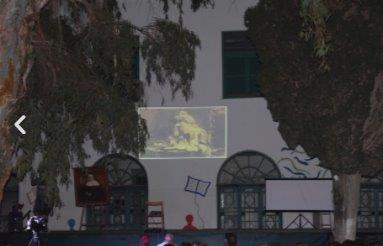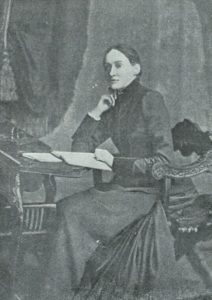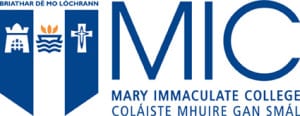Emerging Voices 6: Éadaoin Regan

Éadaoin Regan is currently in the final year of her PhD in the School of English and Digital Humanities, University College Cork. Her thesis, A method to the madness?: Representations of psychological disorder in Irish women’s fiction 1870-1914, employs feminist psychoanalysis and postcolonial theory in its analysis of representations of mental illness in Irish New Woman fiction by Charlotte Riddell, Sarah Grand, George Egerton, Somerville and Ross, B. M. Croker and Clotilde Graves. Prior to her postgraduate research, she was awarded an MA in Literature from Ulster University (2015) and a BA (Hons) in English and History from UCC (2012).
Read MoreDaisy Bates: ‘’Saviour of the Aborigines’
Ann Moroney
The Irish writer Daisy Bates (1859- 1951), successful and infamous in equal measure in her time, left a journalistic legacy that remains virtually unknown today. Born in Tipperary in 1859 but residing for the majority of her life in the Australian outback, Bates camped with numerous Aboriginal tribes over a period of forty years, studying their rituals, documenting their languages and campaigning for their protection. Establishing herself as a unique authority on Australian Aboriginal life and culture, she was dubbed ‘the saviour of the Aborigines’ and devoted her career to informing white Australia about the heritage of indigenous peoples.[1] However, Bates’s views and writings eventually consolidated into an infamous stereotype of the white coloniser: that of an eccentric old woman in the desert, publishing controversial articles and governing tribes of people she believed too primitive to withstand the onset of modernity. She viewed herself as an imperial leader devoted to what she described as ‘the last remnant of a dying race.’[2]
Read MoreEmerging Voices 5: Maria Mulvany

Maria Mulvany is an early career researcher funded by an Irish Research Council Postdoctoral Fellowship. Based at University College Dublin (UCD), Mulvany’s project “Ghostly Fictions: Haunting, Trauma and Time in Contemporary Irish Historical Fiction” engages with recent literary, queer and psychoanalytic theories of spectrality to explore how a selection of historical novels by Emma Donoghue, Anne Enright, Sebastian Barry and others frame the relationship between the past and the present in terms of traumatic haunting. It also complicates the synonymic uses of haunting and trauma by exploring the possibilities of pleasure as a supplementary mode of engaging with the spectral presence of the past in the Irish context. In addition to her own research, Mulvany’s work is also indebted to interdisciplinary and collaborative research. She has worked on a range of fixed-term digital humanities projects including the Nation, Gender, Genre Project, Joyce Portrait 100 and the Rosamond Jacob Diaries Project. Most recently, she has been involved in the development of open access teaching resources and curricula as part of the Digital Methods and Data Literacies teaching and learning initiative, funded by the National Forum for the Enhancement of Teaching and Learning in Higher Education. She is currently expanding the temporal range of her earlier research into modes of haunting by looking at some 19th- and early 20th-century Irish women writers of supernatural fiction such as Rosa Mulholland, Charlotte Riddell and Dorothy McArdle and has developed the first iteration of a related teaching resource on these writers which can be found here.
Read MoreWith Hannah Lynch and the Ursulines in Tinos- A Story of Remarkable Women
Iliana Theodoropoulou
‘I enjoy perfect freedom’. [1]

In 1885 Irish writer Hannah Lynch (1859-1904) set out on travels through Greece that would continue over a period of two years. She began this journey by spending more than half a year as a guest at the Ursuline convent in Loutra on the island of Tinos. More than 130 years later – on Thursday evening, August 26, 2021 – Hannah was again a ‘guest’, metaphorically, in the garden of the Ursuline convent where a photograph of her was projected onto the façade. From her viewpoint there, we might say, she once again enjoyed the spirit and the hospitality of the Tinos Ursulines and shared in the celebration of a publication which included a translation into Greek of her essay ‘The Ursulines of Tenos’ (1886).[2] This essay, published in Tinos last summer in The Chronicle of the Ursulines of Tinos,edited by Father Marco Foscolo, is a very valuable testimony of the history of the convent written by this intrepid nineteenth-century Irish writer and traveler.[3]
Read MoreRecovering the Local-colour Stories of London-Irish Writer and Columnist Erminda Rentoul Esler
Giulia Bruna
Donegal native Erminda Rentoul Esler (1860-1924) was a novelist, short-story writer, and journalist who lived and worked in London from 1889. Notably, W. B. Yeats included her in his 1895 articles on Irish National Literature for The Bookman and there referred to her as ‘writing charmingly of Presbyterian life in Ireland’.[i] With his entry on Esler in the Dictionary of Irish Biography and an essay in Kathryn Laing and Sinéad Mooney’s collection Irish Women Writers at the Turn of the 20th Century,[ii] Patrick Maume has recently made important contributions to the rediscovery and reappraisal of this nearly forgotten Irish writer by addressing gaps regarding her family history, religious background, education, and connections with the London publishing milieu.
Read MoreRemembering Eavan Boland – Open Letter
This is a copy of an open letter addressed to Professor Linda Doyle, Provost of Trinity College Dublin on the subject of memorialising the poet Eavan Boland (1944-2020) from the RASCAL website.
The letter and it’s list of signatories (as of December 16th, 2021) are reproduced here. For updates please check the RASCAL website.
It appeared in The Irish Times December 11th, 2021.
Read More
Emerging Voices 4: Isobel Sigley

Isobel Sigley is currently undertaking a research studentship at Loughborough University, supervised by Dr Sarah Parker and Dr Claire O’Callaghan. Her research considers women’s short fiction from the late nineteenth century through to the early twentieth century and explores the ways in which touch, or the haptic senses more broadly, serves the politicised agendas of the ‘New Woman’ movement. She investigates the affinity between the active and agentic sense of touch and the search for agency and emancipation for late-Victorian women in literature. The Irish ‘New Woman’ authors George Egerton and Sarah Grand feature centrally in this research.
Read MoreEmerging Voices 3: Tara Giddens

Tara Giddens’ PhD project, ‘Investigating the Irish New Woman: Journalists in Media and Fiction’, offers exciting new research into Irish women’s contributions to popular culture and journalism. Focusing on the journalistic and literary careers of Kathleen Coleman, Charlotte O’Conor Eccles and L. T. Meade, her doctoral work was supervised by Dr Tina O’Toole and supported by an Arts, Humanities, and Social Sciences PhD Teaching Fellowship at the University of Limerick.
Read MoreThe Dreamwork of a Nation: From Virginia Woolf to Elizabeth Bowen to Mary Lavin
Patricia Laurence
For a more detailed reading of this subject matter, see Laurence’s chapter ‘The Dreamwork of a Nation: From Virginia Woolf to Elizabeth Bowen to Mary Lavin’ in ‘The Edinburgh Companion to Virginia Woolf and Contemporary Global Literature (2021), Edited by Jeanne Dubino, Paulina Pająk, Catherine W. Hollis, Celiese Lypka, Vara Neverow.
Too often women writers are viewed by critics and scholars as single subjects immersed in the culture and politics of a nation or their times. If we explore a comparative methodology of ‘shared affinities’ and consider and interpret them in national or international networks and pairings (as the IWWN September forum encouraged) we bring new aspects of their lives and new readings into view. Discovering shared affinities sometimes relieves authors of overworked cultural, political and critical positions in which they are stuck in their own contexts and cultures. Engaged in their own writing and experiments in different circles, classes, times or different parts of the globe, they may be unaware of each other. Nevertheless, placing them side by side on a broader global canvas will illuminate cultural and aesthetic refractions. Abandoning the overworked literary category of ‘influence’, I would argue, usefully repositions British and Irish women writers of different generations on a broader canvas.
Read MoreEmerging Voices 2: Shirley-Anne Godfrey

Shirley-Anne Godfrey is an emerging Irish playwright, currently researching how drama and theatre can be used as methodologies in rehabilitating the literary legacies of Lady Augusta Gregory (1852-1932) and Frances Browne (1816-1879) for her PhD at NUI Galway. Funded by the Irish Research Council, Godfrey’s research findings have recently been published in a chapter on “Lady Gregory’s Grania (1912): Myth and Mythology” in David Clare, Fiona McDonagh, and Justine Nakase’s The Golden Thread: Irish Women Playwrights (Liverpool University Press, 2021). Based on her research into Browne, a prolific Donegal poet, novelist, and essayist, Godfrey has written a play titled In My Mind’s Eye, which was chosen for the Lyric Theatre Belfast’s New Playwright’s Programme 2018/2019. The play has had rehearsed readings at the Lyric Theatre as well as at the American Irish Historical Society.
Read More


